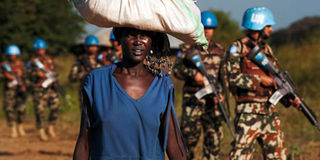Peacekeeping must adapt to new reality

A displaced woman as she carries goods as United Nations Mission in South Sudan peacekeepers patrol outside the premises of the UN Protection of Civilians site in Juba on October 4, 2016. While the UN is facing up to the challenges and shortcomings, we should also recognise the successes. PHOTO | ALBERT GONZALEZ FARRAN | AFP
What you need to know:
- The emergence of global terrorism means that instability anywhere is a threat everywhere.
- We must adapt peace operations to the dangerous and challenging environments they now face.
When I entered the United Nations Secretariat building for the first time as Secretary-General in January, my first act was to lay a wreath honouring more than 3,500 staff who died in the service of peace.
Later that same week, two Blue Helmets were killed in the Central African Republic (CAR), where they were working to prevent violent confrontations between communities from descending into mass killings.
UN peacekeepers place themselves in harm’s way every day, between armed groups that are trying to kill each other or to harm civilians.
COST OF MISSIONS
Countless lives have been saved and improved by UN peacekeeping over the past 70 years.
Research has shown the worth of peacekeeping: it prevents the spread of violence; and it reduces the numbers of civilians killed by more than 90 per cent.
We also know peacekeeping is cost-effective.
The budget is less than half of one per cent of global military spending, and is shared between the 193 member states.
INSECURITY
Studies show that UN peacekeeping missions are eight times more cost-effective than when the US acts alone.
That investment pays off many times over when we consider the economic growth and prosperity that follow from increased stability and security after successful peacekeeping.
The emergence of global terrorism means that instability anywhere is a threat everywhere.
UN peacekeeping operations are on the frontlines of our efforts to prevent the emergence of lawless regions where insecurity, transnational crime and extremism can flourish.
GENOCIDE
Our missions have contributed to stability, and economic growth from El Salvador to Namibia, and from Mozambique to Cambodia.
Fifty-four operations have completed their mandates and closed; two more, in Liberia and Cote d’Ivoire, will do so in the months ahead.
While the UN is facing up to the challenges and shortcomings, we should also recognise the successes.
The CAR was facing the threat of genocide when peacekeepers arrived two years ago.
Today, the country has elected a new government in a peaceful and democratic process.
LOCALS DISPLACED
Our mission is providing crucial support to reduce the threat posed by armed groups.
In South Sudan, UN peacekeepers are sheltering 200,000 civilians who fled when their homes were destroyed.
UN peacekeepers are providing security for humanitarian agencies to deliver aid.
Our missions are increasingly targeted by parties to conflict and violent extremists.
QUICK DEPLOYMENT
Dealing with this new reality requires a serious strategic reform based on an analysis of the mandates and capacities of our missions and our partnerships with governments and others.
We must adapt peace operations to the dangerous and challenging environments they now face.
We have already made reforms that have reduced costs and given us greater flexibility to deploy peacekeepers at short notice.
But more remains to be done. UN peacekeeping has been tarnished in recent years by appalling cases of sexual exploitation and abuse that are an outrageous violation of everything we value.
EDUCATION
Tackling this scourge is a priority for the whole UN system.
I have presented a plan to all member states aimed at ending impunity, and will create victims’ rights advocates in our peacekeeping missions and at UN headquarters.
When people around the world are asked about their priorities, from New York to New Delhi, from Cairo to Cape Town, they give the same response.
They want safety and security, to raise their children in peace and give them education and opportunities to shape their future.
UN peacekeepers are one of the ways in which we deliver on that universal aspiration and make the world safer for everyone.
Mr Guterres is the Secretary-General of the United Nations





